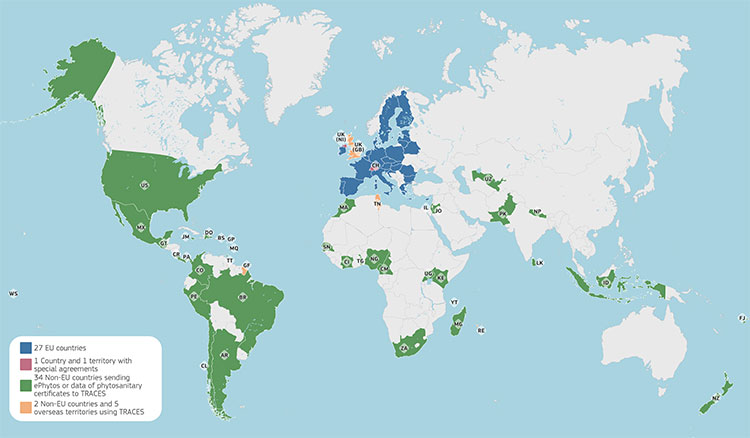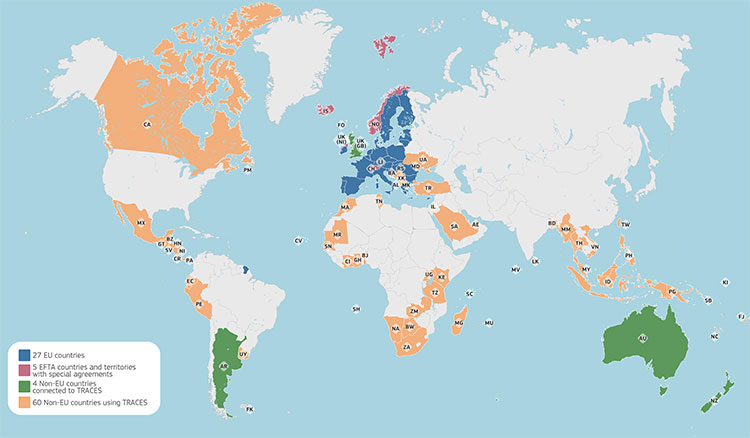TRACES at a glance
Each year, vast quantities of live animals and goods are being traded within and into the European Union (EU) for the benefit of over 440 million Europeans, raising the question: how can the European citizens be sure that the food reaching their plates is safe?
For this reason, the European Commission has taken extensive action over the past years to ensure the safety of the agri-food chain. The establishment and operation of TRACES has been an essential component of this accomplishment.
TRACES is the European Commission's online platform for animal and plant health certification required for the importation of animals, animal products, food and feed of non-animal origin and plants into the European Union, and the intra-EU trade and EU exports of animals and certain animal products.
This video provides a summary of the background and purpose of the TRACES platform.
Key figures
Aim of TRACES
Today, TRACES is an indispensable tool used in about 90 countries, with more than 113 000 users worldwide for the issuance of sanitary and phytosanitary certificates and official documents required for imports, intra EU movements and exports from the EU of animals and goods.
The main objective of the TRACES system is to streamline the certification process, all related entry procedures and to offer a fully digitised and paperless workflow in line with the European Commission’s policy priority, ‘A Europe fit for the digital age’.
The benefits of TRACES
TRACES is the platform in which traders can issue official documents and where national authorities can monitor and ensure that trade of live animals and goods are adhering to and complies with the requirements and conditions defined by the European legislation. It is an efficient tool to ensure:
1. Increased transparency
TRACES facilitates the exchange of data, information and documents between all involved trading parties and control authorities and therefore simplifies and speeds up the administrative procedures.
The integrated statistical tool allows the extraction of valuable data in relation to imports into the EU, exports from the EU and intra-Union trade. For a comprehensive list about the activities that TRACES accommodate, visit the TRACES modules and features page.
2. Traceability and food safety
The possibility to trace back and forth all the movements of animals, animal products, food and feed of non-animal origin and plants contributes to the reduction of the impact of disease outbreaks and allows for a quick response to counter certain serious risks along the agri-food chain.
3. Enhanced cooperation and coordination
The TRACES platform fosters collaboration between the competent authorities of EU countries and non-EU countries, but also between the traders themselves and their competent authorities. When a decision is taken on a consignment, the involved parties are notified and have access to the relevant documents.
TRACES allows for the quick detection of fake certificates and therefore contributes to the fight against food fraud and enhances cooperation and collaboration between authorities.
Availability of the platform
TRACES is available in all EU official languages, and several non-EU languages, which facilitates the use of TRACES also for the authorities of non-EU trade partners.
The platform is accessible 24 hours a day, 7 days a week, free of charge. In order to access the system, only internet connection and an EU Login account are required.
Legal foundations
In response to the 1997 outbreak of classic swine fever in Europe, the European Parliament passed Resolution A5-396/2000 urging the European Commission to enhance the traceability of animal movements within the single market.
Consequently, a new computerised system was set up that integrated the functions of the ANIMO and SHIFT systems into a single architecture based on the European Commission adopted Commission Decision 2003/24/EC.
Subsequently, the new system was named “Traces” by Commission Decision 2003/623/EC.
TRACES is subject to the rules and requirements laid down by:
- Regulation (EU) 2017/625 of the European Parliament and of the Council (Official Controls Regulation) – which states that TRACES is integrated as one of the components of the Information Management System for Official Controls (IMSOC).
- Commission Implementing Regulation (EU) 2019/1715 (IMSOC Regulation) - which lays down rules for the functioning of the information management system for official controls and its system components (TRACES, iRASFF, ADIS, EUROPHYT).
The TRACES system is managed by the TRACES – IMSOC team, Unit G.4 – Official controls of DG SANTE.
The TRACES Timeline
- 2024TRACES is turning 20 years old.
TRACES continues to facilitate movements of animals and goods, and it also plays an important role in ensuring their traceability across the globe.
Working along with other information systems managed by the Commission, official controls can be performed more efficiently, and the application of the Union agri-food chain legislation can be monitored.
The statistical tool QlikView is replaced by QlikSense, enhancing the visualisation of TRACES data.
- 2022
All TRACES operations are moved to the TRACES NT platform as TRACES Classic platform was decommissioned. In 2022, over 2.3 million documents (~50% of total) were signed electronically, replacing documents of paper format.
- 2019
The Commission adopts the IMSOC Regulation to lay down the rules for the functioning of the IMSOC and its system components (TRACES, iRASFF, ADIS, EUROPHYT).
Additionally, the new Official Controls Regulation has expanded the scope of TRACES to all the categories of animals and goods subject to official controls at the border control posts of the European Union.
The use of TRACES to issue the Common Health Entry Document (CHED) for animals and goods entering the European Union has become mandatory since 14 December 2019.
- 2018
TRACES introduces the PHYTO module for the issuance of phytosanitary certificates by non-EU countries for consignments of plants and plant products imported into the European Union.
- 2017
The new TRACES NT platform is launched with a modern, more user-friendly interface and functionalities. TRACES also starts to accommodate other departments’ modules widening the scope of the system and strengthening the cooperation along the agri-food supply chain.
- 2013
TRACES grew significantly during the first decade by accommodating over 5 modules and linking its data with other IT systems of the Commission, such as iRASFF. In 2013, the platform expanded to the plant health domain as well.
The data registered in TRACES, was made accessible to authorities by introducing the statistical tool called QlikView.
- 2006
TRACES introduces the IMPORT module for the issuance of official certificates to the European Union by non-EU countries.
- 2004
The TRACES Classic system is established with the objective of creating a single, integrated computerised veterinary system, available to all Member States, for the recording of intra-Union movements and imports of animals and certain goods.
Accessibility of TRACES
More than 113 000 users from over 90 countries worldwide are interconnected through TRACES, centralising all data, simplifying, and accelerating exchange of data.


Related links
- TRACES NT platform
- TRACES NT Documentation website
- Non-EU Approved Establishment lists
- Approved EU food establishments
- Animal by-products approved establishments
- Lists of Border Control Posts (Veterinary)
- Lists of BCPs & CPs (Products of non-animal origin)
- Lists of BCPs & CPs (Plants)
- Technical specifications (ABP establishments)
- Technical specifications (Food establishments)
TRACES e-Learning module – BTSF Academy platform
- TRACES and the Issuance of the CHED/NoA (CHED – NoA modules)
- The use of TRACES for certifying intra-union movement (INTRA – AJL – DOCOM modules)
- TRACES and the Issuance of Certificates for Export from the EU (Veterinary exports – Phyto for export modules)
- TRACES and non-EU countries (EU Import – Phyto – Listing modules – for non-EU users)
